Protein powder is an incredibly useful tool for weight loss because it can help you drop body fat, retain lean body mass, and even maintain weight you’ve lost already on a diet.
Protein powder has a number of useful biological effects that make it easier to drop fat and retain lean muscle, and it functions well as a meal replacement because it fills you up while kicking your metabolism into high gear.
If you are trying but struggling to lose weight, adding a protein powder to your weight loss routine might be just what you need. Our researchers have ranked the best protein powders for weight loss so you can get the best results possible.
Research
Rankings
1. Ladder Whey Protein Powder
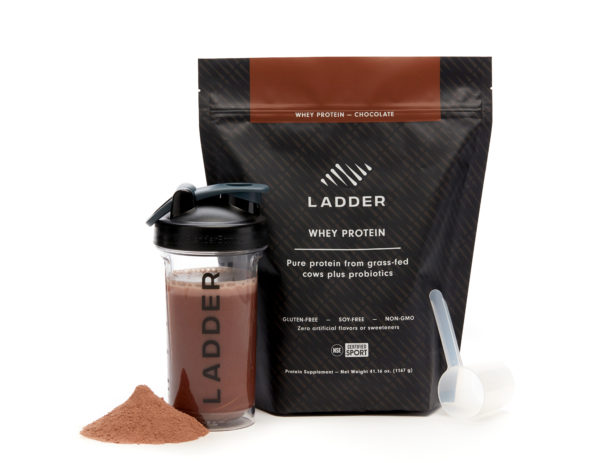
Whey protein by Ladder offers a hefty dose or pure whey isolate and casein, helping to maximize fullness and metabolism. Each serving also includes probiotics to help support a healthy gut flora, further promoting a positive weight loss environment.
There are no artificial ingredients to be worried about. Ladder whey protein is also very low carb, making it ideal for weight loss.
2. Ancient Nutrition Bone Broth Protein
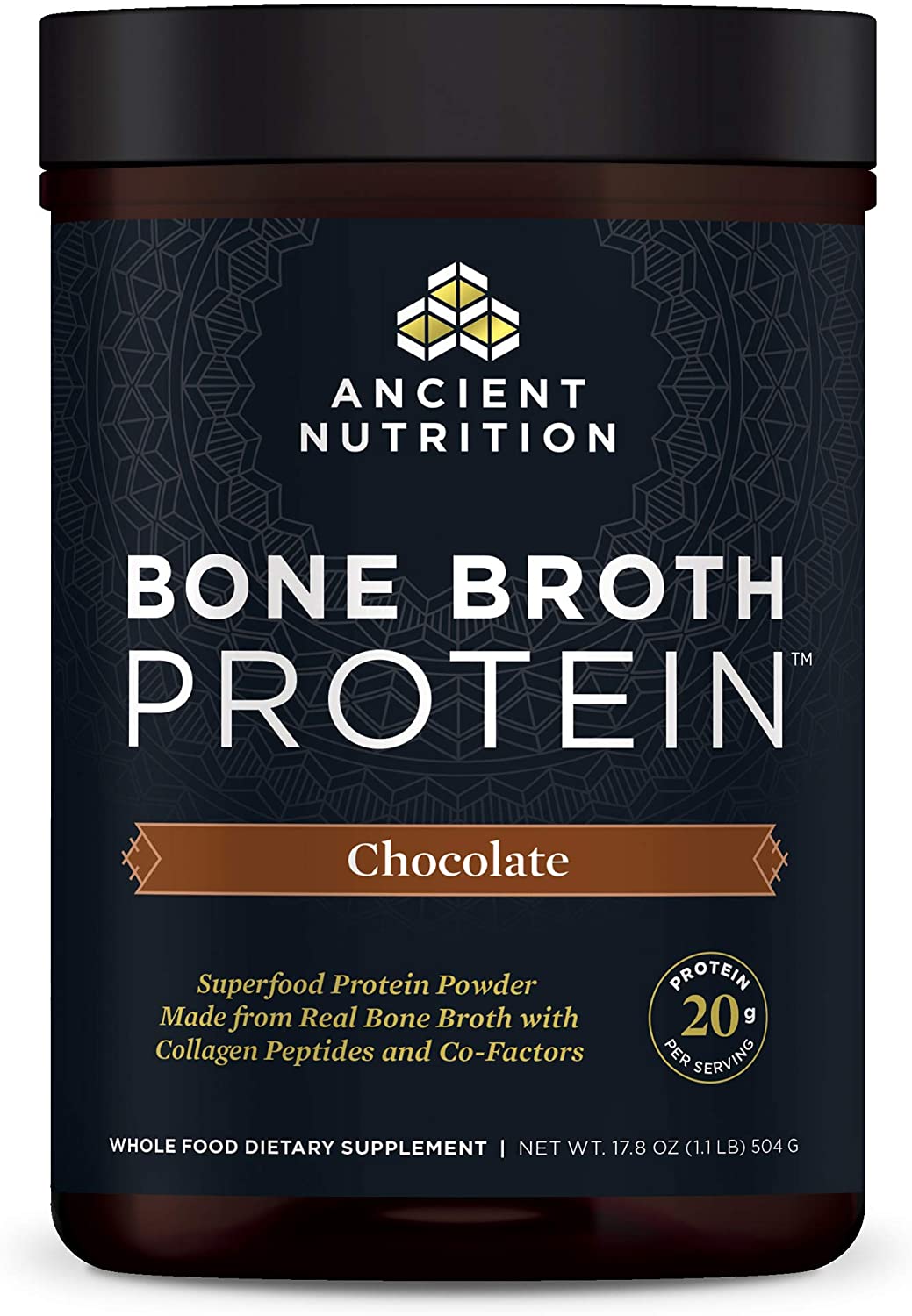
Ancient Nutrition is the market leader when it comes to bone broth protein. It’s sourced from beef bones, which gives it a complete amino acid profile and plenty of collagen as well, and on top of that, the flavor comes from non-caloric naturally-occurring sweeteners, as opposed to sugar. This is a great combo when it comes to weight loss, since it’s optimal both for stimulating thermogenesis and suppressing appetite.
3. Optimum Nutrition Gold Standard 100% Whey Protein
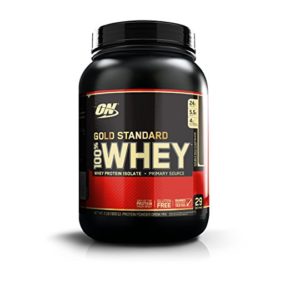
Optimum Nutrition makes a whey protein that is one of the standard-bearers of the industry. It uses a blend of whey protein isolate, whey protein concentrate, and whey peptides, along with both natural and artificial flavors.
The amino acid profile is robust, and it tastes great, making it a good go-top option if you can’t stand the taste of a normal protein shake.
4. Left Coast Performance Bone Broth Protein
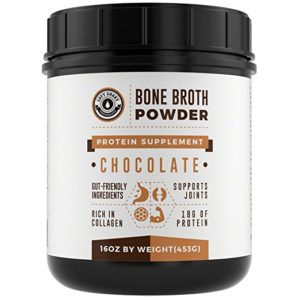
If you follow a paleo, keto, or low carb diet to lose weight, Left Coast Performance Bone Broth Protein is one of the best choices out there.
It’s in line with the restrictive requirements of the keto and paleo diets, and this protein derived from beef bones has a robust, comprehensive amino acid profile. Because of that, it’s more effective at increasing your body’s metabolic rate than a plant-based protein.
The chocolate flavor uses natural flavoring, stevia, monk fruit, and a tiny bit of cane sugar—but don’t worry, the sugar content is less than a gram per serving.
5. Manitoba Harvest Organic Hemp Yeah!
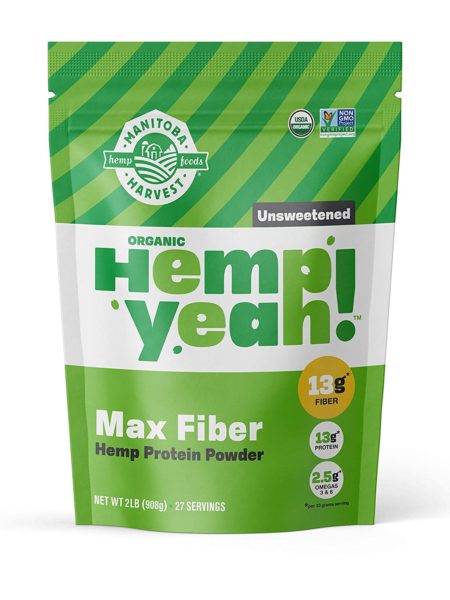
Hemp protein is a great way to leverage the weight loss benefits of protein alongside the benefits of dietary fiber, another all-natural supplement that is incredibly useful when it comes to weight loss.
Hemp seeds, from which this protein powder is derived, are packed with protein and fiber, meaning that there’s about over a gram of fiber for every gram of protein in this supplement.
The certified organic, Canadian-grown source is an added bonus: it means this product is far less likely to contain traces of harmful pesticides.
6. Garden of Life Raw Organic Protein
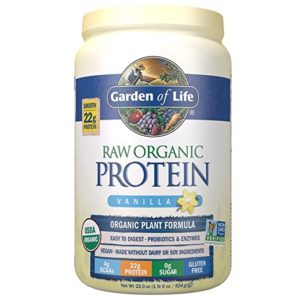
When it comes to using a protein powder as a meal replacement while on a diet to lose weight, Garden of Life offers a number of distinct advantages.
First, its combination of pea protein, rice protein, and a number of grain sprouts means it’s got a complete amino acid profile.
Second, these grain sprouts mean there’s a lot more in the way of vitamins and minerals than what you’d normally find in a protein powder.
With only two grams of carbohydrates and zero grams of sugar, it’s definitely well-suited for weight loss.
7. Vega Protein and Greens
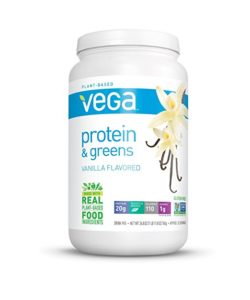
Vega Proteins and Greens is a plant-based protein powder that’s a good way to address one concern of using a protein shake as a meal replacement, which is missing out on the nutrients in “greens”—vegetables like kale and spinach.
Vega Protein and Greens uses pea protein powder as its protein and adds in kale, spinach, and broccoli extracts, as well as stevia as an all-natural sweetener, making it a solid choice if you are looking for a plant-based protein for weight loss.
8. Orgain Organic Protein Powder
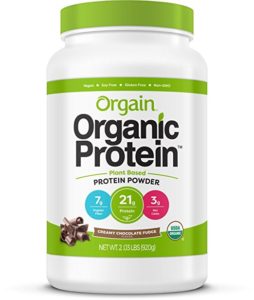
As one of the best vegan protein powders on the market, this is a great weight loss option for people looking to avoid animal or dairy-derived protein sources.
The fact that it uses protein from peas, brown rice, and chia seeds helps ameliorate one of the issues of plant-based proteins: namely, their somewhat limited amino acid profile.
Its organic certification is great to see, and Orgain also includes a number of plant-based creamers and sweeteners to improve the taste and help the powder blend up easily in a shake or a smoothie.
The erythritol non-caloric sweetener might be a turn-off, and it’d be better if Orgain opted for stevia or monk fruit instead, but aside from that, it’s hard to find faults in this protein powder.
9. Ora So Lean & So Clean
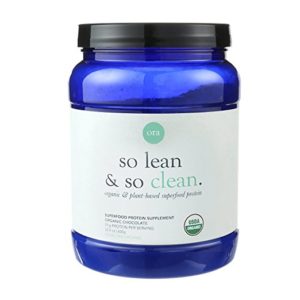
Ora makes a plant-based protein powder whose protein content comes from peas and sprouted rice.
The defining feature of this protein powder is its inclusion of superfood extracts from fruits and vegetables, as well as a selection of enzymes that help you digest and absorb the nutrients in this protein powder more effectively. It’s a decent choice when it comes to plant-based protein for weight loss.
10. Kiss my Keto Protein Powder
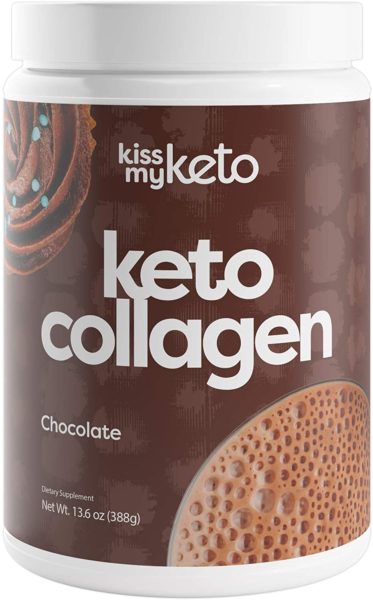
Kiss my Keto is, as its name suggests, a great protein powder for those following a ketogenic diet. It includes collagen peptides as its source of protein, and MCT oil as its source of fat.
These are combined in a 2:1 ratio, so you’re getting a substantial amount of fat per unit protein. This is great if you are intentionally shooting for a high fat diet, but other users would be better served by getting a protein powder that has more protein per serving. The MCT oil necessarily lowers the protein concentration by weight.
11. Less Naked Whey
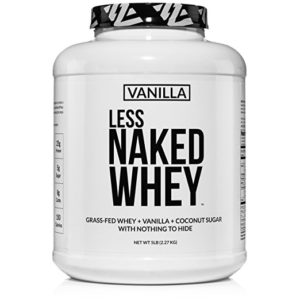
Less Naked Whey is great from a purist’s perspective. It uses only a few all-natural ingredients; namely, whey protein concentrate, coconut sugar, and cocoa powder. This means a solid amino acid profile, great taste, and no artificial ingredients or non-caloric sweeteners.
The only downside? The coconut sugar adds a non-negligible amount of sugar: five grams for every 25 grams of protein. Many people on a diet would rather opt for a protein powder that’ slower in its sugar content.
Category winners
Best protein powder for weight loss overall: Ladder Whey Protein Powder
Ladder Whey Protein Powder is our top overall pick because of its excellent balance of rapidly-absorbed whey protein isolate and long-lasting casein protein. The high concentration of animal protein makes it great for weight loss, since animal protein tends to be more effective at suppressing appetite and stimulating your metabolism.
Best protein powder for rapid weight loss: Ladder Whey Protein Powder
Cutting weight fast? Ladder Whey Protein is the way to go. It’s got a complete amino acid profile, meaning you won’t have to worry about missing out on any essential amino acids, and on top of that, the casein protein content provides sustained amino acid availability, which is especially important if your overall caloric intake is very low.
Best protein powder for paleo diet weight loss: Ancient Nutrition Bone Broth Protein
If you’re using the paleo diet to lose weight, Ancient Nutrition Bone Broth Protein is the perfect companion. This paleo-friendly protein tastes great and doesn’t rely on excessively processed ingredients or sugar either. The high-quality beef-based protein gives you a steady supply of amino acids and collagen as well.
Best protein powder for women looking to lose weight: Ladder Plant Protein Powder
Ladder’s plant-based protein is great for women looking to lose weight thanks to its inclusion of a blend of pea protein and plant-sourced branched-chain amino acids (BCAAs). These BCAAs improve both thermogenesis and appetite suppression, both of which are favorable properties for losing weight.
Best protein powder for athletes cutting weight: Ladder Whey Protein Powder
Ladder’s whey protein is perfect for athletes looking to cut weight, thanks to its balanced formula that includes both rapidly-absorbed whey protein isolate for post-workout recovery and casein protein for sustained amino acid availability. These properties make it particularly well-suited for athletes who are training hard while on restricted calorie diets.
Best protein powder for weight loss on a low-carb diet: Ancient Nutrition Bone Broth Protein
Bone broth protein is a favorite among people on low-carb, paleo, and ketogenic diets, and Ancient Nutrition makes one of the best bone broth proteins out there. Unlike some of its competitors who rely on sugar to add flavoring, Ancient Nutrition uses naturally-sourced carb-free stevia and luo han guo in addition to cocoa powder, which add no carbohydrates to the formulation.
Who should buy protein powder for weight loss?
Protein powder for weight loss is safe for most individuals and can help in a variety of ways to help improve your weight loss efforts, specifically through increasing satiety, muscle growth, and energy expenditure. It may also help with strength gains and improve muscle recovery post-workout.
Depending on the source, protein powder may not be appropriate for all lifestyles – especially people with milk or dairy allergies. People taking medication should also speak to their doctor before taking a protein powder supplement for weight loss.
How we ranked
When ranking the best protein powder for weight loss, we first looked at the type of protein used. Based on research, animal protein powders tend be more filling than plant-based ones – making them more effective for weight loss. They also tend to contain all the essential amino acids necessary for proper growth and recovery. As such, we ranked animal-based products like Optimum Nutrition a lot higher on our list. Performance Lab Sport was the exception for the use of Oryzatein, which is the only plant protein shown to build muscle as effectively as whey.
Building off this, we preferred whey protein isolate over other types of animal protein like whey concentrate, casein, and egg. Whey protein isolate has been shown to build more muscle and provides amino acids faster in the bloodstream. In addition, it is far cleaner than other types and tends to cause almost no digestive issues – especially when compared to casein and concentrate. That being said, a blend of high-quality isolate and casein was our top choice. This provides both fast and slow releasing proteins with minimal digestive distress; the main reason why Ladder ranked so high.
Lastly, we looked at sweetness. Products that included a ton of extra sugar were eliminated immediately as the insulin spike can cause weight gain issues. Artificial sweeteners and colors were also frowned upon as the long term research is unclear on the negative issues down the line. Products that were naturally sweetened, using only wholesome ingredients, were rewarded accordingly.
Benefits
Protein fills you up and makes you less hungry. Since the success of high-protein diets like the Atkins diet, scientists have tried to uncover the biological mechanisms behind why these diets seem to work.
Two primary benefits have been attributed to high protein diet: increased satiety and increased thermogenesis, according to research out of Harvard University’s School of Public Health (1).
Satiety is the feeling of fullness that you get after a large meal which makes you disinterested in eating more. The high amino acid content of protein creates a hormonal response in your body that creates a feeling of satiety.
The overall effect is that you’ll be less likely to overeat at your next meal, and your overall caloric intake will go down.
A high protein intake increases your caloric expenditure. Increased thermogenesis is the other main benefit of protein for weight loss.
Thermogenesis is an upregulation of your body’s metabolic rate, and while all macronutrients (carbs, fat, and protein) create thermogenesis, protein is by far the most effective.
A 2002 study in the Journal of the American College of Nutrition demonstrated that protein intake creates twice as much thermogenesis as an equivalent caloric amount of carbohydrates or fat (2).
Once you’ve lost weight, protein can help you keep it off. This was the finding of a 2004 study published in the International Journal of Obesity (3).
A 50 gram per day increase in protein intake among subjects who had completed a weight loss program resulted in a 50% decrease in the amount of fat mass regained during the subsequent three months after the dieting program was completed, compared to a control group which did not supplement their dietary protein intake.
Protein helps you lose body fat, not muscle. The specific effect of protein on body fat is extremely useful, and this finding has been replicated in studies on weight loss, too.
Supplemental protein helps you lose more fat and maintain muscle mass (4). This means you are on track for a physique which is both leaner and stronger.
Side effects
As far as weight loss supplements go, protein powder is probably the safest one out there. It’s just a concentrated version of the protein you’d get in typical foods like milk, eggs, or peas.
Observational studies on bodybuilders, who consume a tremendous amount of protein every day, have not noted any harmful effects even of these very high protein intake levels (5).
If you are lactose intolerant or have a dairy allergy, you’ll likely want to opt for a lactose-free protein powder instead of a dairy-derived protein powder, but fortunately there are plenty of great options that don’t rely on a dairy source.
Some research indicates that people who are obese and already have type two diabetes or kidney disease may want to consult with a doctor before increasing their dietary protein intake, since there is the potential for high protein intake to hamper kidney function and increase blood pressure, which could increase risk for heart disease.
However, for people who want to lose weight who are otherwise healthy, protein has no risks (6).
Recommended dose
To achieve most of the weight loss benefits of protein, you should supplement your typical diet with 50 grams of supplemental protein per day.
Keep in mind that this number pertains to the actual protein content, which varies based on the exact type of protein you’re using. Bone broth protein, for example, is usually over 90% protein, so just a few more grams (about 55, to be precise) of protein powder is necessary to hit the recommended dose.
At the other extreme, hemp protein powder is usually only 50% protein by weight, thanks to its high dietary fiber content. As a result, you’d need to double this amount to 100 grams of hemp protein powder.
The satiety-inducing effects of protein powder suggest that the best time to take protein is in the morning or the afternoon, instead of in the evening or at night.
This way, you can make the most of the fullness-inducing effects of protein and consume fewer calories throughout the day.
Beyond this, many high protein diets will far exceed the 50 gram threshold, which is okay.
This number comes from clinical trials that intend to bump up dietary protein intake from about 15% of total calories to 18%, but a high protein diet contains substantially more protein than this. As noted above, for healthy people, even very high protein intakes are quite safe.
FAQ
How does protein affect weight loss? Protein affects weight loss through improved metabolism and its influence on weight-regulating hormones such as ghrelin, the primary hormone that causes hunger (7). Improved metabolism occurs as a result of protein requiring more calories to digest than fats and carbohydrates (between 20-30% of calories from protein are burned while the protein is being digested) (8).
Does protein decrease cravings and make weight loss easier? Studies show that in addition to decreasing overall appetite, protein reduces cravings in between meals and in the evening. Research shows that whey, egg, and pea proteins, in particular, can reduce overall food consumption and cravings (9).
What type of protein is best for weight loss? Most types of protein have nutritional benefits associated with weight loss, but multiple randomized controlled trials have established that whey protein is one of the most powerful (10). Casein protein can help with weight loss but is much less effective than whey in most studies.
Egg white proteins have not been as thoroughly researched in weight loss, but these show some promising results comparable to whey protein (11). Egg white proteins are also easy to digest and full of all nine essential amino acids.
Pea proteins also need more research but are shown to be effective in helping build muscle during resistance training (12).
Soy protein does not seem to have significant effects on weight loss (13). Though soy protein can have other nutritional benefits, whey protein still seems to be best for individuals trying to lose weight, with casein and egg white proteins also showing promise.
Does protein have other benefits besides weight loss? Protein is a building block of the entire body and can help build and repair tissue, hair, and nails. It helps create enzymes and hormones that regulate the body’s other functions, too.
What are the forms of protein for weight loss available on the market? Though protein is present in many foods, protein shakes, powders, and bars are commonly available with concentrated and specialized forms of protein. Each of these products contains proteins in concentrated, isolated, and/or hydrolysate forms.
Protein concentrate is obtained by extracting the protein from foods and is between 60-80% protein and 20-40% carbohydrates and fat. Protein isolate is created by further processing protein concentrate to remove the carbohydrates and fat, making a final product that is 90-95% protein.
Protein hydrolysates are the result of even more processing using acids or enzymes. The resulting protein is easier for the body to absorb.
Why is protein important for losing weight? Protein is being recognized as an increasingly important tool when it comes to weight loss. Supplementing your diet with extra protein has a number of biological effects that are very useful for accelerating your weight loss, and moreover, influencing what you lose (muscle versus fat) in a beneficial way.
In some sense, it’s not weight that’s the problem, it’s fat. Protein powder helps you drop body fat while preserving muscle mass, and moreover, high protein diets are easier to stick to than other diets for weight loss. This alone would make protein useful, but when combined with its other effects, makes it downright essential for optimizing your weight loss program.
Are protein concentrates, isolates, or hydrolysates better for weight loss? If you’re physically active, the differences between concentrates, isolates, or hydrolysates can vary, with older adults seeing no difference and other age groups seeing varied results (14).
Since protein concentrate can still be high in fat and carbs, it may not be beneficial to individuals with sedentary lifestyles. Protein isolate can be good for individuals who need a high-protein, low-carb option. Hydrolysates can be absorbed more quickly by the body, but high-quality protein hydrolysates are more expensive than concentrates or isolates. Unless you’re a serious bodybuilder, you may not need the extended benefits of hydrolysates.
Does protein for weight loss have any side effects? Though protein itself does not have any side effects in healthy adults, individuals must be careful to consume appropriate amounts of other nutrients like carbohydrates and fiber. Some older studies suggested that high-protein diets could contribute to osteoporosis, but those concerns have since been debunked (15).
Who sells protein for weight loss? Specialized protein shakes, powders, and bars are available at a variety of online and brick-and-mortar retailers. Online retailers typically have a larger selection and have user reviews to help buyers make informed choices.
How much protein should I consume daily? Studies show that individuals who consume about 30% of their calories as protein may be more successful in weight loss (16). This allows the individual to maintain a healthy amount of other nutrients while maximizing the weight loss potential of protein.
On a 2,000-calorie diet, this means consuming around 150 grams of protein per day. While some of this protein comes in the form of meats and nuts consumed during meals, you likely also need additional protein shakes and powders to reach 150 grams.
When should I take protein for weight loss? Protein intake should be spread out over the course of the day in order for the body to metabolize it effectively. Each meal should contain at least 40 grams of protein to hit the 150-gram target. Additional protein can be consumed in the form of healthy snacks.
Which foods have the most protein for weight loss? High-protein foods include meats, fish, legumes, eggs, dairy, and nuts. Any type of eggs and dairy are high in protein, but cottage cheese and Greek yogurt are especially high. The highest-protein meats are chicken, turkey, and other low-fat meats, and the best fish include salmon, sardines, and trout. Legumes like kidney beans and lentils are excellent for high-protein soups, and nuts like almonds and pistachios are perfect for a post-workout snack.
Protein powders, bars, and shakes are great for on-the-go professionals who don’t always have time for healthy high-protein meals. Though some have added sugars, a quick look at the nutrition label can help you choose a healthy option. Certain protein supplements, especially those that contain protein hydrolysates, may be easier for the body to digest and absorb than proteins from whole foods.
Can I use protein both for weight loss and for muscle gain? Even for athletes, building muscle and losing weight simultaneously can be difficult. However, protein can reduce muscle loss during diets (17).
To get a fit, lean body, increase your protein intake while also working out with strength training. This can improve body tone and appearance, especially when paired with cardio workouts.
How many calories should I consume when using protein for weight loss? The optimal caloric intake depends on your current weight and activity levels and varies typically between 1,800 and 2,000 calories for individuals who are exercising regularly.
To lose weight, individuals must burn more calories than they consume. No amount of protein can directly change this equation. Though protein consumption inherently burns more calories than other types of nutrients, consuming junk food and other high-calorie products may offset this benefit.
How should I exercise in order to lose weight while taking protein for weight loss? The World Health Organization recommends that all healthy adults aged 18-64 get at least 150 minutes per week of moderate-intensity exercise, but lower amounts can still be beneficial (18). Individuals should aim to work out up to 150 minutes per week if they wish to achieve and sustain a healthy weight.
Though protein most directly helps build muscle, cardio, and weight training are both important for weight loss. Cardio and high-intensity interval training (HIIT) both burn more calories than weight training. In one study with healthy men, HIIT during a hydraulic resistance system burned around 12.6 calories per minute, while running on a treadmill burned around 9.4, compared to 8.8 from weight training (19).
However, weight training can also increase resting metabolism, slightly improving the chances of weight loss, especially in men. In order to unlock the full potential of protein for weight loss, individuals can incorporate enough total minutes of cardio and weight training to create a net loss of calories each day.
Can teenagers take protein for weight loss? Teenagers and children may need increased protein, but this is due to their rapid growth. Serious athletes may benefit from protein supplements, but minors should not take additional protein for weight loss unless specifically directed by a doctor.
Can pregnant women use protein for weight loss? Pregnant and nursing women typically need more calories per day. While some of these calories can and should come from protein, pregnant and nursing women need to consult with a doctor before starting any weight loss plan.
Can older adults use protein for weight loss? Seniors over 55 can still use protein for weight loss. However, since protein usually works best when paired with strength training, seniors should consult with a personal trainer and their physician before beginning any strength training regimen.
Seniors must also take care to maintain an appropriate balance of calcium and other nutrients to prevent osteoporosis.
Who shouldn’t take protein for weight loss? Individuals with whey, casein, or egg protein allergies should avoid whey protein powders and shakes. Instead, they can increase their protein intake by eating more lean meats, nuts, and legumes.
Individuals with a history of eating disorders like anorexia or bulimia should consult with their doctor before beginning any weight loss plan or making any dietary changes. People with kidney disease should avoid high-protein diets, as excessive protein intake can negatively impact kidney function (20).
Unless specifically instructed by a doctor, diabetics should avoid taking protein supplements that contain protein hydrolysates, as they can boost insulin levels more than other types.
Should I avoid carbs while taking protein for weight loss? Carbohydrates are an important fuel for workouts, and eliminating them entirely may cause loss of energy. Since strength training is essential to developing a healthy and fit body, consume your carbs before and after workouts.
Does protein for weight loss affect stamina? Protein helps build muscle, and having more muscle may improve stamina in some cases.
Related articles
- Protein powder
- Vegan protein powder
- Casein protein powder
- Whey protein powder
- Snacks for weight loss
- Protein powder for women
- Weight loss programs
Recap
Supplemental protein is a great way to augment your weight loss program, thanks to its ability to make you feel full and satiated, as well as its beneficial effects on increasing your body’s metabolic rate, which leads to greater overall energy expenditure.
The best proteins for weight loss have a complete amino acid profile, which helps them increase thermogenesis to a greater extent than plant proteins derived from a single protein source.
During periods of weight loss and weight loss maintenance, protein powder also helps you retain lean body mass and lose body fat. The ultimate result is a leaner and more athletic physique, which is something everyone can aspire to.
For BodyNutrition’s #1 recommended protein powder for weight loss, click here.